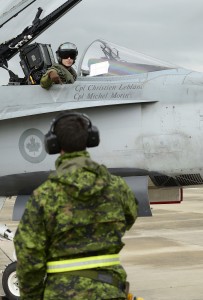
Working as a police officer or firefighter, in the armed forces, or in challenging occupations like commercial diving can be a rewarding career. But good eyesight is a critical ‘must-have’ qualification for these jobs, so vision issues can close the door on exciting opportunities. Thankfully, procedures such as LASIK and other surgical options can ensure your vision meets the standard for potential candidates.
Commercial Diver
“Several of the divers I’ve worked with have had successful laser eye surgery,” says commercial diving instructor Vern Johnston of the Commercial Diving Institute of Canada in Kelowna, B.C. “There was no issues at all and it was a very positive experience.”
Johnston adds that with some divers working on offshore oil platforms for extended periods, sometimes for as long as 120 days, maintaining proper eye hygiene with contact lenses can be a challenge. Plus, there’s the rare but risky situation where gases can be trapped under the lens as the divers ascend and decompress. Perhaps most importantly, because the divers are wearing helmets while underwater, those who choose surgical vision correction, don’t have to worry about a mishap while below the surface.
“If glasses come off underwater you can’t fix them or get them back on,” notes Johnston.
A comprehensive overview of the requirements for occupational diving operations can be found in Section 24 of the CSA standards.
Canadian Air Force Pilot
For those who prefer being airborne instead of underwater, laser eye surgery can also be a good career move. In 2008, the Canadian Air Force changed its policy regarding laser refractive surgery after an in-depth study of the technology, outcomes, and standards of practice for these procedures. The new rules made it possible for qualified individuals who had undergone laser eye surgery to serve as pilots and aircrew.
“I am very pleased with the decision to allow serving and potential aircrew to undergo Laser Refractive Surgery,” said the Medical Advisor to the Chief of Air Staff, Navy Captain Cyd Courchesne. “It is an effective procedure that will make it possible for many talented individuals, who would otherwise not have met the aircrew visual standard, to pursue an exciting career operating CF aircraft.”
Because the policy permits only specific types of laser eye surgery that have a very successful track record, if you are considering surgical vision correction before joining the military, make sure to check with your recruiting officer before you undergo the procedure.
Police Officer
Local police forces and the RCMP also have minimum vision requirements. Laser eye surgery is permitted by the Vancouver Police Department to meet their visual acuity standards, but not Orthokeratology. The VPD standards are:
- uncorrected vision: 20/40 with both eyes open, with one eye no worse than 20/100
- corrected vision: 20/20 with both eyes open, with one eye no worse than 20/40
- colour vision: colour vision must be normal (if there is any issue with colour vision, the applicant must pass the Farnsworth D-15 test)
- peripheral vision: 150 continuous degrees along the horizontal meridian binocularly, and 30 degrees above and below the fixation point.
The Delta Police Department has similar standards:
- Vision of not less than 20/40 in one eye and 20/100 in the other, unaided; corrected to 20/20 and 20/30 with lenses. Candidates who have had successful laser eye surgery will be considered.
These are the requirements for the RCMP, who police many municipalities in Metro Vancouver and across the country:
Visual Acuity
Corrected vision (with glasses or contacts): Visual acuity must be at least 6/6 (20/20) in one eye and 6/9 (20/30) in the other.
Uncorrected vision (without glasses or contacts lenses): Visual acuity must be at least 6/18 (20/60) in each eye OR 6/12 (20/40) in one eye and at least 6/30 (20/100) in the other eye.
This minimum vision acuity is required for safe performance of policing duties if glasses or contacts are lost or displaced.
Field of Vision
Must be at least 150 degrees continuous along the horizontal meridian and 20 degrees continuous above and below fixation with both eyes open and examined together.
Depth Perception
Normal stereo vision (use of both eyes to judge distances) must be present. Stereo acuity must be 100 seconds of arc or less on the TITMUS Test or equivalent.
Colour Vision Testing
Using any standardized Pseudo-Isochromatic plates (Ishihara, A-O, HRR, Dvorine). If you correctly identify all patterns presented in such tests, your colour-vision will be considered normal.
If needed, further evaluation will be conducted with devices such as Farnsworth D-15 discs. If you demonstrate a colour-vision deficiency on the Farnsworth discs, you will not meet the vision standards requirements of the RCMP.
Firefighter
For those considering a career as a firefighter in Metro Vancouver, they must meet the standards described in the National Fire Prevention Association’s NFPA 1582 – Comprehensive Occupational Medical Program for Fire Departments. Here are those guidelines as outlined by the Vancouver Fire Department:
- Colour vision safe (Refer to NFPA 1582, Chapter 6)
- 20/30 corrected binocular vision, or 20/100 uncorrected binocular vision, or better (Refer to NFPA 1582, Chapter 6)
Boydvision’s range of surgical vision correction procedures could make the difference in your suitability for an exciting career. If you would like to learn more about your options, please give us a call (604-430-9560 or toll-free at 1-877-355-3937) or use our online form to arrange a free, no-obligation consultation.
